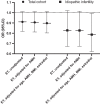The impact of anti-Müllerian hormone on endometrial thickness in gonadotropin stimulation/intrauterine insemination cycles: is there an effect on pregnancy outcomes?
- PMID: 36745295
- PMCID: PMC10224886
- DOI: 10.1007/s10815-023-02736-9
The impact of anti-Müllerian hormone on endometrial thickness in gonadotropin stimulation/intrauterine insemination cycles: is there an effect on pregnancy outcomes?
Abstract
Purpose: To study the association, if any, between anti-Müllerian hormone (AMH) and pre-ovulatory endometrial thickness (ET) in gonadotropin/intrauterine insemination (IUI) cycles.
Methods: This retrospective cohort study included a total of 964 patients undergoing 1926 gonadotropin/IUI cycles at an academic fertility center. Primary outcome measure was the association between serum AMH and measured ET on the day of and the day before human chorionic gonadotropin hormone (hCG) ovulation trigger. The effect of a model combining AMH and ET on early pregnancy outcomes was a secondary measure.
Results: In 52.8% of cycles, ET was last assessed and recorded on the day of hCG administration, while in the remaining 47.2% on the day prior to trigger. In unadjusted regression models, AMH was weakly correlated with ET on hCG trigger day [bAMH (95%CI) = 0.032 (- 0.008, 0.070), p = 0.015]. When adjusting for potential confounders, the positive correlation became significant [0.051 (0.006, 0.102), p = 0.047]. Similar findings were observed when assessing the correlation between AMH and ET on the day prior to hCG trigger. ET was non-significantly associated with the odds of clinical pregnancy, when adjusting for potential confounders, except for when restricting the analysis to couples with idiopathic infertility [OR (95%CI), p-value: 0.787 (0.623, 0.993), 0.044].
Conclusion: Our findings support an effect of serum AMH on endometrial development in gonadotropin induced cycles, even when adjusting for the diagnosis of PCOS. ET was not associated with the odds of achieving a clinical pregnancy, except for couples with idiopathic infertility.
Keywords: Anti-Müllerian hormone; Endometrial thickness; Gonadotropins; Intrauterine insemination.
© 2023. The Author(s), under exclusive licence to Springer Science+Business Media, LLC, part of Springer Nature.
Conflict of interest statement
The authors declare no competing interests.
Figures
References
-
- Hansen KR, Peck JD, Coward RM, Wild RA, Trussell JC, Krawetz SA, et al. Intrauterine insemination performance characteristics and post-processing total motile sperm count in relation to live birth for couples with unexplained infertility in a randomised, multicentre clinical trial. Hum Reprod. 2020;35(6):1296–1305. doi: 10.1093/humrep/deaa027. - DOI - PMC - PubMed
-
- Bakkensen JB, Christou G, Dimitriadis I, James K, Souter I. The effect of follicular phase length on cycle outcomes and endometrial development in gonadotrophin ovarian stimulation/intrauterine insemination cycles. Reprod Biomed Online. 2020;40(3):362–368. doi: 10.1016/j.rbmo.2019.12.007. - DOI - PubMed
MeSH terms
Substances
LinkOut - more resources
Full Text Sources
Medical


